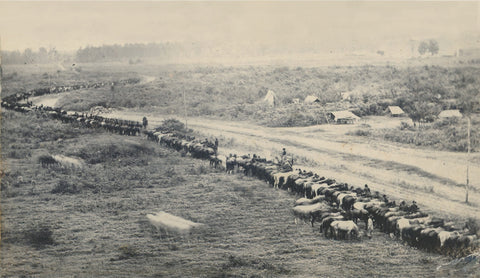
Deep Cut Into Dixie: Inside the Union Raid That Tore the Heart Out of Mississippi
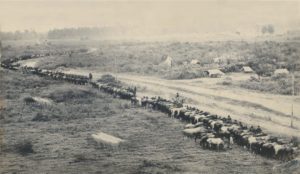
The arrival of Colonel Benjamin Grierson and his saddle-sore troopers in Union-occupied Baton Rouge, La., on May 2, 1863, simultaneously caused both relief and excitement throughout the region. Grierson’s cavalry had barely slipped through the grasp of the pursuing Confederates on several occasions, managing to reach safe haven after a long and treacherous expedition originating in LaGrange, Tenn. Brigadier General Halbert E. Paine of Wisconsin, 3rd Division commander in the Army of the Gulf, later described the incoming horse soldiers as “rough and ready Illinois cavalrymen embrowned by their raid through the Confederacy unkempt and frowsy.” The weary men set up what they called “Camp Magnolia Grove” and finally had a chance to rest uninterrupted.
Stationed outside New Orleans when he heard the news, Corporal George W. Southwick of the 1st Vermont Light Artillery on May 6 elatedly wrote—albeit with a few misspellings—“900 cavalry made a good sweep down through from Tennessee to Baton Rouge. They made a good sweep tareing up railroads burning bridges cuting telegraph wires and raising the divil in general. It is the greatest thing that has ever transpired since this war broke out.”
For the Northern public, this was not mere hyperbole. Cavalry raids in late 1862 and early 1863 by Confederate Generals Earl Van Dorn and Nathan Bedford Forrest had disrupted Union Maj. Gen. Ulysses S. Grant’s supply lines in Mississippi and Tennessee, greatly frustrating Grant’s advance on the important Mississippi River port city of Vicksburg. A Union response of some scale was needed, leading to Grierson’s daring raid behind enemy lines.
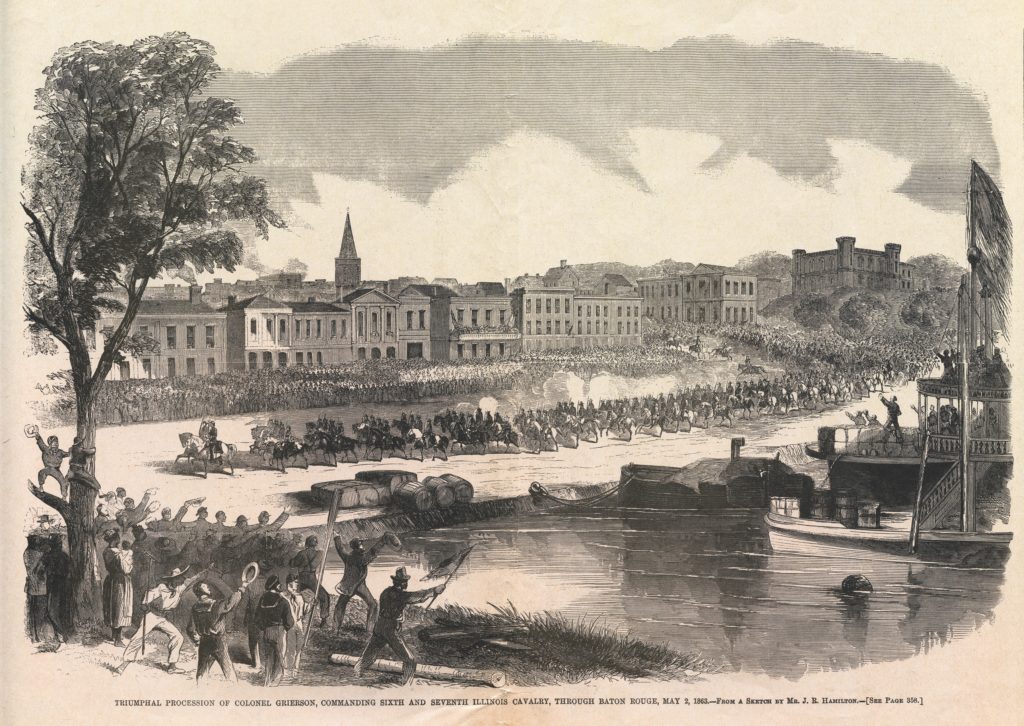
In the wake of the raid, Captain Henry Clinton Forbes, who commanded Company B of the 7th Illinois Cavalry, took time to write his wife a detailed account of the role he and his men had played in the venture, planting himself on a hill in front of the Louisiana State House to do so. Although Forbes—labeled “a dashing sagacious captain of 30” by one relative—later compiled an official report, these initial thoughts, still fresh in his mind, provided valuable insight. Portions of the letter to his wife, now in a private collection, are published here for the first time.
The brainchild of this “expedition southward into Mississippi” on horseback was Union Maj. Gen. Stephen A. Hurlbut, commander of the 16th Corps, headquartered in Memphis, Tenn. Obtaining quick approval from Grant, Hurlbut called Grierson to his headquarters for a detailed description of his idea. Grant had planned a series of diversions to throw the Southern forces off balance. Northern Mississippi was to be rife with Federal advances, certainly drawing enough attention away from Grant’s river operations and Grierson’s maneuvers.
Forbes’ own description of the raid’s start was rather matter of fact: “Well, I was in my blankets, on my particular five feet nine of mother earth at ten o’clock P.M. 16th-April at LaGrange where we had been so long and so quietly doing duty at Headquarters of the 1st Div., 16th Army Corps, when an orderly brought me a dispatch from the general commanding, ordering me to report to the Commanding Officer of my regiment, for ‘duty on this expedition.’ Reporting immediately, I learned that three regiments comprising our brigade [6th Illinois, 7th Illinois, and 2nd Iowa] were ordered to march at daylight the next morning with five days rations.”
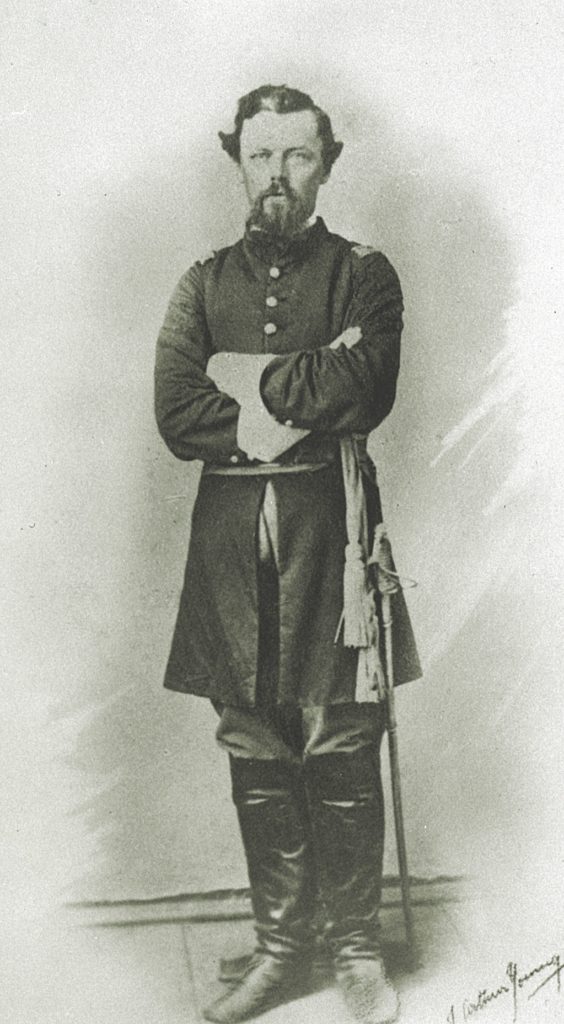
“By special favor,” Forbes recalled, “I learnt that we were to make a deep cut into ‘Dixie’ and at the dawn we were in our saddles.” Of their departure, Forbes noted, “42 men and both my lieutenants McCausland and O’Kane, provided each man with a [Cosmopolitan] carbine and fifty rounds of ammunition, a saber and a gay heart. We were within the enemy’s lines; ahead, a wilderness of secession and enmity…”
The troopers had an inkling it was to be a long raid, but, as Grierson elaborated, “No person other than myself and Lieutenant S.L. Woodward, a.a.a. [acting assistant adjutant] general of the brigade knew the probable extent of the expedition on which we had started.”
Wanting his wife to know the exact route they took, Forbes recommended: “Now take the best map of the State of Miss. you can get and you shall march with us. You observe Tippah County next to the N.W. of Ripley its county seat, having marched 35 miles. There we found plenty of Com. [Commissary] Fodder and meat, which we appropriated with a liberal understanding of our own wants. The soonest of objections only enlisted the sweetest of smiles, but the inexorable ‘can’t help it’ of the pleasant ‘Feds’ only left the grief of the impoverished secesh the deadlier and the deeper.”
Forbes would also boast: “Through the northern edge of Pontotoc Co. you will observe the Tallahatchie river running in a southwestern course. This stream the Rebs had vaunted no Yank should ever pass alive again. Accordingly, we passed it, the central Column a couple of miles above New Albany. One battalion at Kingsford [King’s] Bridge, below, and the 2nd Iowa above. About twenty secesh men found by the advance guard endeavoring to fire [King’s] Bridge, but were readily dispersed and the crossing effected.” These, Forbes noted, were part of a cavalry force dispatched by Major A.H. Chalmers, but when word that a larger force of Yankees was headed their way, “they had suddenly left in the night, going west.” The clash, though, had served to warn Grierson of a possible attack from the rear.
The next morning, Forbes’ Company B took the lead and had “several lively chases after little squads of the enemy”—a singular “rebel scout…shot on the edge of town” being the only notable interaction. Commissary stores were destroyed, including “a number of barrels of salt [which were] poured in the street, not that it had lost its savor, but that it might be trodden under foot by our horses.”
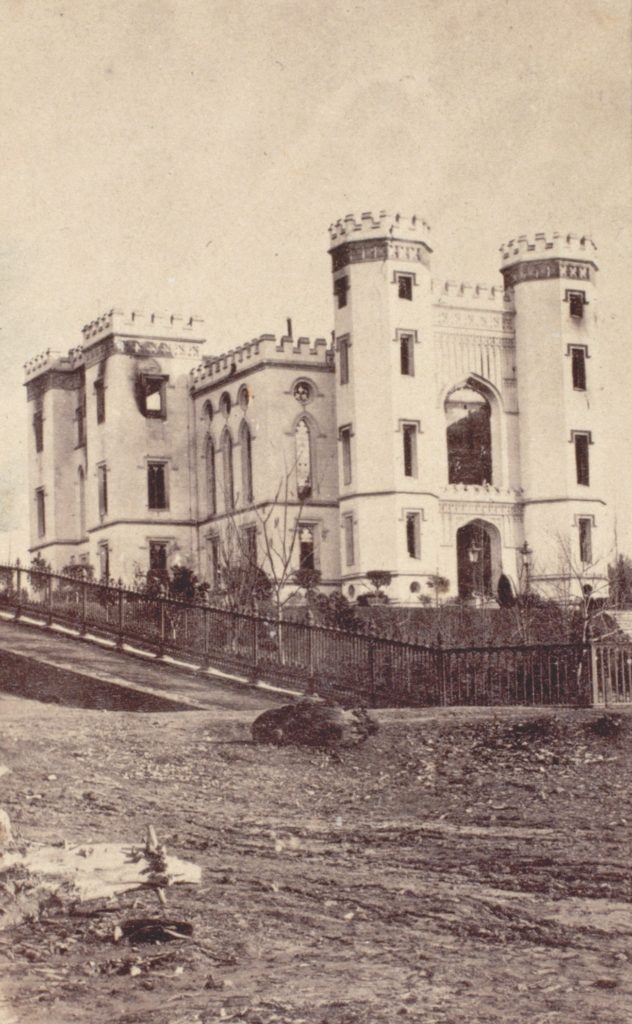
The malicious act sent the civilians scrambling for the valuable commodity. As Forbes wrote, “You should have seen the unsalted poor jubilant with their pails to scratch the precious condiment out of the dirt! One poor woman I remember with peculiar zest, who, as she came in sight of the long white line of salt spilled across the street turned to our column then in full motion and with her bonnet hastily snatched from her head in one hand and her pail in another powerless to express her joy in Language jumped up and down in her place and actually screamed in delight.”
Forbes’ baleful tendencies were further exposed when he recalled: “Another amusing incident occurred near the rear of the column where my company was stationed….I heard a dire knocking behind some fine premises against whose fence our horses were turned, and passed through to see what was doing when I found our boys in the act of very generously distributing some five or six hundred weight tobacco which they had discovered. The man of the house having run away, his lady very affectingly besought me to set a guard for his property, which I very magnanimously proceeded to do. Some delays, accountable to the uninitiated, having been experienced, when I finally went to set my guard, behold the tobacco, the boys and the duty, which, as a gallant Knight owed to a fair one in distress, I was not at all sorry to find had all vanished together!”
On April 20, Grierson’s command was “roused by the shrill reveille bugles at 2 o’clock in the morning.” By then, Grierson had already “sent back all the sick and disabled men”—an ensemble to be dubbed the “Quinine Brigade”—through Pontotoc in an effort to further confuse the Confederates of his true intentions. Forbes and his men “drew a deeper breath and set out again for Dixie, which like ‘away down east’ you may discover is difficult to reach.”

“We marched south east by byroads and encamped at Clear Spring,” Forbes wrote. “No event occurred worthy of note, save that being below the advance of our troops upon any former occasion, we began to perceive the most ludicrous panic in possession of the minds of the people. No language can give an adequate idea of the prepossession of the popular mind in Central Mississippi, against the Yankee soldiery, all chimerical, all whimsical, the work of false witnesses in the only journals which come to their hand, a part of the great system of atrocious fabrication upon which the rebellion was based at the first, and by which it is diligently sought to be perpetrated.”
Grierson continued his efforts at subterfuge on April 21, when he detached Colonel Hatch and the 2nd Iowa Cavalry. They were, Forbes noted, “striking eastward with his command for the Mobile and Ohio R.R. to work it whatever mischief lay in his power and diverting the attention of the enemy from our progress midway between the two roads to return at his convenience to our lines.” Grierson’s main command crossed a local creek and, according to Forbes, “[Upon entering] Starkville, a neat and pleasant village, we found almost entirely deserted of its inhabitants, they newly fled in terror of the Yankee invasion. The place was tenderly treated, not a house being broken, not a person molested, though afterwards the secesh papers published that we burned the town and hung one of the physicians.”

“We camped 8 miles beyond [Starkville],” Forbes continued, “having marched 45 miles thru interminable swamps, and captured a number of prisoners, among which was a quartermaster from Port Hudson.” About two miles out after dawn, Colonel Prince asked Forbes if he was willing to take his command of 39 men to Macon and if possible destroy the [rail]road at that place. They were instructed to then rejoin the main column by forced marches.
Forbes readily accepted the assignment and started out toward Macon “as rapidly as the slippery roads would permit.” One soldier, however, quickly suggested: “The detachment to be thrown against this [railroad] was used as a forlorn hope and was expected to be thrown away.”
Forbes’ men noticed the roads were tracked with hooves of livestock “driven in to the swamps to be hidden by negroes” to avoid capture. Several women, Forbes noted, “burst into tears as we passed without biting their noses off.” The group also encountered wagons loaded with food and valuable goods hub-deep in mud. Forbes directed a couple of his men to dress in captured “secesh” clothes and scout ahead of their unit. The detail would arrest a few locals, while one man attempted to make a break for it before getting “a saber stroke for his temerity.” Company B finally halted and bivouacked in the yard of a local plantation. “Just as I was finishing my piece of pone and cup of buttermilk,” Forbes wrote, “…picket posts came in with a prisoner captured.” Forbes learned that a Southern infantry regiment had arrived in Macon by rail, bolstered by two artillery pieces and local militia.
Forbes was not pleased to learn that the bridge he was suppose to cross “had been prepared for instantaneous destruction.” They all slept restlessly that night with “23 men out of 39 sustaining various parts of guard duty for that night.” Realizing that at least 30 miles separated Company B from Grierson’s main body, Forbes impressed a guide to lead them to Baugh’s Ford, which they “found impassable owing to a[n] exceedingly heavy current.” They ended up crossing a bayou, finally making their way to the Marshallville road. They turned and went through a menagerie of “swamps, plantations, wildernesses, dens, logs, pens, lakes, pits and caves of death.” They swam two more streams and eventually struck the road running southwest from Macon to Philadelphia about four miles from the former, “pushing with all speed.”
As Forbes would later document: “We passed thru Summerville, called Gholson on Colton’s maps, just before sundown. It is a beautiful little hamlet, the seat of two popular schools finely situated in large buildings, one for either sex. We were mistaken for secesh cavalry by the boys of the first school, and amid the most exaggerated demonstrations of pleasure we made in enjoying the glory of being their brave defenders. The girls rushed to their balcony to wave us all hail, the matrons to their larders to procure us a lunch and invitations to the officers to sup here.” The men of Company B passed up those opportunities but finally stopped at Mr. Nunn’s plantation. Recalled Forbes: “We entered into negotiations for feed and supper all in the pure Secesh vernacular. Out came the fodder, out came the corn; the smokehouse disgorged, the ovens glowed, the churn gave up her all (of buttermilk), even the knives and spoons found their way on to the table cloth.”
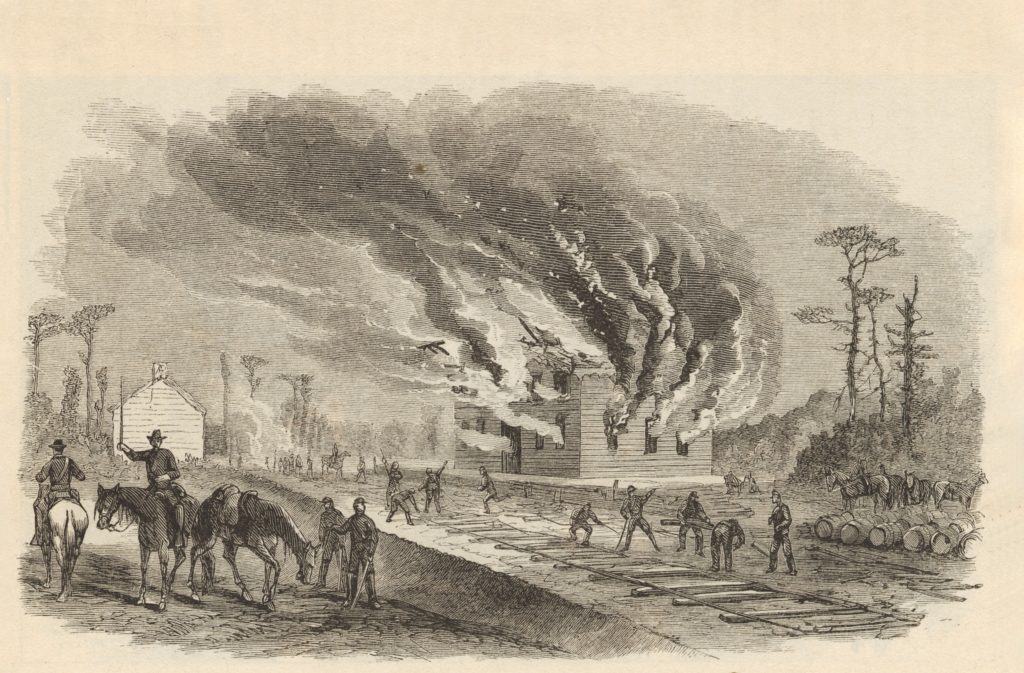
Forbes had a confidential confab with his host, where the latter expressed his dire contempt of the Yanks. Nunn began to entertain “misgivings in his mind and neuralgia in his stomach” when he heard the bugles sound and came outside to discover “one of the boys whose horse had become way worn had traded him incontinently for an available nag that he found neighing patriotically for U.S. Service in the poor patriarch’s stables. The last I heard of our host was an inquiry for the Captain, and upon being told that he was in advance, he lifted up his voice, and called me just as I was engaged in shouting forward! March! Which of course, shut off forever the noise of his complaints and divided the Yankees and fair Summerville for a season. Poor Nunn! May he repent and believe. Though he is old in transgression, and hardened in false doctrines.”
Forbes’ men were making great time, resting for four hours at Pleasant Spring after traversing 60 miles. On the 24th, the company passed through “a poor and barren company.” The side trip became dangerous when the two scouts Forbes had dispatched ahead encountered bushwhackers, with one scout killed and the other wounded. The Confederates “had done their bloody work and disappeared before we could canter on to the ground.” They gathered up the dead man and “laid him on a neighboring porch and spread a blanket decently over him and left him for the enemy to bury. Our haste would brook no delay. Poor Bill Buffington! God gave him good sleep under the green trees of this far land!” Forbes had his revenge, however, revealing, “I enjoyed the pleasure of burning to the ground the home of one of the bushwhackers.”
Upon reaching Newton Station, the troopers found the train depot smoldering. Expecting to cross the bridge Grierson had used, they discovered it had been destroyed by their own forces and headed instead toward Enterprise. There, Forbes came upon a “suspicious looking enclosure of high plank fence around a school house…[that] I speedily discovered was full of soldiers and a sentry to be standing at the gate.”
In the middle of his next sentence, however, the narrative ends. Forbes had spilled coffee on this 14th page and neither finished his thoughts nor the missive itself. He had also spilled ink on the first page.
Forbes later boasted to his sister about going “48 hours without food,” despite revealing quite the opposite to his wife. He also claimed to have lost 22 pounds, despite his earlier descriptions of eating sumptuous meals from the hands of Southern civilians or their storehouses.
Forbes became a farmer after the war and published a large volume of his own poetry. He would pass away on January 5, 1903, in Champaign, Ill.

